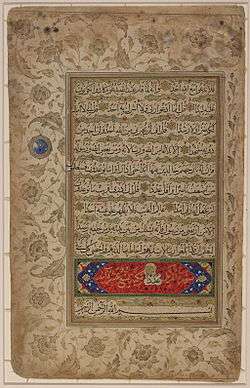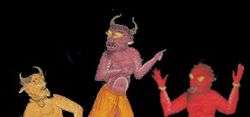Exorcism in Islam

Exorcism in Islam is called ruqya, and is thought to repair damage believed caused by sihr, witchcraft or evil eye. Exorcisms today are part of a wider body of contemporary Islamic alternative medicine called al-Tibb al-Nabawi (Medicine of the Prophet).[1]
Islamic religious context
Islam has the concept of a malevolent Devil. Belief in Jinns, or supernatural beings, is also widespread in the Islamic world.[2][3]:68[4]:193:341
Reasons for possession
While Satan (named Iblis) is said to be a tempter; whispering evil suggestions to the human heart. Jinn are often held in folklore to be able to enter a human body physically or haunting them mentally. A possession by a Jinn can happen for various reasons. Ibn Taymiyyah explained a Jinn could sometimes haunt an individual, because the person could (even unintentionally) harm the jinn; urinating or throwing hot water on it, or even killing a related jinn without even realizing it.[5] In this case the jinn will try to take revenge on the person. Another cause for jinn possession is when a jinn falls in love with a human and thereupon the jinn possesses the human.[6] Some women have told of their experiences with jinn possession; where the jinn tried to have sexual interaction from inside their bodies. [7] A third reason is: when a jinn is evil and simply wants to harm a human for no specific reason, it will possess that person, if it gets the opportunity, while the human is in a very emotional state or unconsciousness.[8]
Signs of possession
In islamic belief, there are different signs of possession for example:[9]
- Procrastination in doing good acts or praying
- Constant laziness
- Recurring aggression
- Loss of senses while awake
- Constant headaches
- Recurring nightmares
- Laughing while asleep
- Sleepwalking
In case of a "complete control" by the Jinn, the possessed surrender to the Jinn and the persons consciousness is subverted by it. Such a jinn is indeed absolutely evil and thereupon the acts of the person are going to be evil as well. The person will obey the commands of the jinn at anytime. In a "constant possession" the person will not act without a command by the jinn.
According to reports of individuals who have claimed to be possessed, they've asserted that during the jinn possession their spiritual abilities, like the sixth sense, had increased.[10] Possession can also cause physical damage, such as inexplicable bruising or marks appearing spontaneously.[11]
Procedure
In a typical Islamic exorcism the treated person lies down while a white-gloved therapist places a hand on their head while reciting verses from the Quran.[1][12]
Specific verses from the Quran are recited, which glorify God (e.g. The Throne Verse (Arabic: آية الكرسي Ayatul Kursi) and invoke his help. In some cases the adhan/"ah-zan" (the call for daily prayers) is also read, believed to have the effect of repelling non-angelic unseen beings or the jinn.
The Islamic prophet Muhammad taught his followers to read the last three suras from the Quran, Surat al-Ikhlas (The Fidelity), Surat al-Falaq (The Dawn) and Surat an-Nas (Mankind).
(e.g. The Throne Verse (Arabic: آية الكرسي Ayatul Kursi) :-
| Arabic | Translation |
|---|---|
|
اللّهُ لاَ إِلَـهَ إِلاَّ هُوَ الْحَيُّ الْقَيُّومُ لاَ تَأْخُذُهُ سِنَةٌ وَلاَ نَوْمٌ لَّهُ مَا فِي السَّمَاوَاتِ وَمَا فِي الأَرْضِ مَن ذَا الَّذِي يَشْفَعُ عِنْدَهُ إِلاَّ بِإِذْنِهِ يَعْلَمُ مَا بَيْنَ أَيْدِيهِمْ وَمَا خَلْفَهُمْ وَلاَ يُحِيطُونَ بِشَيْءٍ مِّنْ عِلْمِهِ إِلاَّ بِمَا شَاء وَسِعَ كُرْسِيُّهُ السَّمَاوَاتِ وَالأَرْضَ وَلاَ يَؤُودُهُ حِفْظُهُمَا وَهُوَ الْعَلِيُّ الْعَظِيمُ |
Allah - there is no deity except Him, the Ever-Living, the Sustainer of [all] existence. Neither drowsiness overtakes Him nor sleep. To Him belongs whatever is in the heavens and whatever is on the earth. Who is it that can intercede with Him except by His permission? He knows what is [presently] before them and what will be after them, and they encompass not a thing of His knowledge except for what He wills. His Kursi extends over the heavens and the earth, and their preservation tires Him not. And He is the Most High, the Most Great. |
This is not the only "Procedure"; there are many used in Muslim communities around the world. Examples are beating the afflicted, rolling in carpets and exposure to red pepper smoke. Most of them are absorbed from local pagan rituals, and they are not derived from Islamic teaching.[13]
Popularity of Islamic alternative medicine

The trend in al-Tibb al-Nabawi treatments, cosmetics and toiletries is often associated with fundamentalists who charge that Western, chemically laced prescriptions aim to poison Muslims or defile them with insulin and other medicines made from pigs.[1] Members of terrorist groups have been involved in Islamic remedies as healers and sellers, while some clinics are used as recruiting grounds for Islamist causes.[1]
“Islamic medicine carries a cachet that, by taking it, you are reinforcing your faith – and the profits go to Muslims,” says Sidney Jones, an expert on Islam in Southeast Asia with the International Crisis Group.[1]
See also
References
- 1 2 3 4 5 Hallowell, Billy (26 September 2011). "Some Asian Muslims Giving Up Western Meds for Islamic Exorcisms & Treatments". TheBlaze.
- ↑ Quran 51:56–56
- ↑ al-Ṭabarī, Muḥammad ibn Ayyūb. Tuḥfat al-gharā’ib. I.
- ↑ Rāzī, Abū al-Futūḥ. Tafsīr-e rawḥ al-jenān va rūḥ al-janān.
- ↑ ʻUmar Sulaymān Ashqar The World of the Jinn and Devils Islamic Books 1998 page 204
- ↑ Moiz Ansari Islam And the Paranormal: What Does Islam Says About the Supernatural in the Light of Qur'an, Sunnah And Hadith iUniverse 2006 ISBN 978-0-595-37885-2 page 55
- ↑ Kelly Bulkeley, Kate Adams, Patricia M. Davis Dreaming in Christianity and Islam: Culture, Conflict, and CreativityRutgers University Press 2009 ISBN 978-0-813-54610-0 page 148
- ↑ Moiz Ansari Islam And the Paranormal: What Does Islam Says About the Supernatural in the Light of Qur'an, Sunnah And Hadith iUniverse 2006 ISBN 978-0-595-37885-2 page 55
- ↑ Moiz Ansari Islam And the Paranormal: What Does Islam Says About the Supernatural in the Light of Qur'an, Sunnah And Hadith iUniverse 2006 ISBN 978-0-595-37885-2 page 55
- ↑ Kelly Bulkeley, Kate Adams, Patricia M. Davis Dreaming in Christianity and Islam: Culture, Conflict, and CreativityRutgers University Press 2009 ISBN 978-0-813-54610-0 page 148
- ↑ G. Hussein Rassool Islamic Counselling: An Introduction to Theory and Practice Routledge 2015 ISBN 978-1-317-44125-0 page 58
- ↑ Staff (14 May 2012). "Belgium court charges six people in deadly exorcism of Muslim woman". Al Arabiya.
- ↑ sorry forgot to put Citation or Source. for the section of "just to note", I have over eight year of education in Islamic Teachings with none of my teachers ever describing any physical procedures. "Note for whoever is going to delete this section saying - not properly referenced - take my edit to any real Muslim cleric and he will testify, I do not have any blog or third rated book to support my edit. " my citation is the quran.